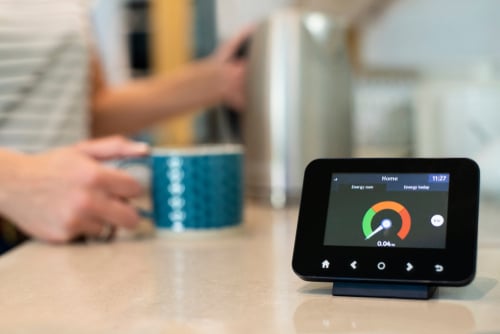In the current UK property market, there’s a growing interest in sustainable housing among homeowners and buyers. This trend leads to a preference for eco-friendly and energy-efficient homes, which is expected to continue throughout 2024 and beyond.
Overview of sustainability and the UK property market
In the UK property market, the persistent demand for housing is outweighing availability, resulting in escalating prices and increased challenges for homeownership. Simultaneously, there’s more public concern regarding energy efficiency and climate change.
However, the ongoing cost-of-living crisis is the main contributor to the surge in demand for energy-efficient homes. Consequently, sustainable housing is rising, aligning with buyers’ preferences for energy-efficient options.
Top 5 methods to improve a home’s energy efficiency
Numerous strategies are available for homeowners seeking a more sustainable and energy-efficient home. Here are our top five methods:
- Energy-efficient design: Elevate energy efficiency through enhanced insulation to minimise heat loss and decrease dependence on older heating systems. Explore renewable energy systems like solar panels or advanced technologies such as heat pumps. Even basic adjustments like switching to LED bulbs offer a straightforward yet impactful way of enhancing your property’s energy efficiency.
- Sustainable materials: One component of sustainable housing involves using environmentally friendly materials, often ethically sourced, and incorporating recycled or reclaimed elements. For instance, contemplate utilising recycled materials or choosing bamboo flooring as a sustainable substitute for traditionally used hardwoods.
- Integrate water-saving technologies: Consider water conservation to enhance your home’s sustainability. Prioritising these approaches can mitigate water wastage and lower water-related expenses. Examples include using low-flow fixtures: these will reduce water usage whilst still working effectively. Greywater recycling systems will repurpose wastewater for activities like toilet flushing, saving freshwater resources.
- Smart home systems: Smart home systems are gaining popularity in both new constructions and existing properties, providing enhanced energy optimisation features. These systems allow remote monitoring and control of various home functions, offering convenience and increased savings on energy bills. Examples include:
* Modifying heating and cooling settings according to weather conditions and occupancy.
* Automatically adjust lighting levels to reduce energy usage.
* Monitoring indoor air quality to ensure the best levels of ventilation.
5. Electric charging ports: As electric vehicles become increasingly popular, more households are installing electric vehicle charging stations, enhancing accessibility to electric cars. Even if you don’t currently own an electric car, installing a charging station is a forward-looking investment for the future. These stations also enhance the resilience and future of sustainable homes, anticipating the continued growth in electric car uptake.
Advantages of energy-efficient housing
The advantages of sustainable housing go beyond environmental benefits, including a better quality of life and improved financial stability:
- Cost efficiency: Sustainable homes offer reduced utility bills thanks to their energy and water-efficient design. Features like energy-saving appliances and insulation lead to monthly savings, contributing to long-term financial security.
- Enhanced indoor air quality: Sustainable homes prioritise indoor air quality using renewable materials and smart technology. This reduces the need for increased ventilation in older homes constructed with poorly made materials.
- Increased property values and market appeal: With a growing demand for eco-friendly living spaces, sustainable homes typically gain higher property values and attract more buyers in the UK market. Features such as solar panels and green certifications enhance marketability, ensuring long-lasting value and quicker selling times.
- Improved comfort and lifestyle: Sustainable houses prioritise homeowner comfort and well-being. With efficient heating and cooling systems and smart home technology, they offer homeowners higher comfort, convenience, and functionality.
Challenges and considerations for sustainable housing
Despite the evident benefits we’ve discussed, several barriers still threaten the widespread adoption of sustainable housing practices. Let’s examine some of these challenges:
- Higher initial costs: The high initial expenses associated with sustainable materials and technologies, as opposed to traditional methods, can deter homeowners despite the evident long-term savings.
- Limited labour and expertise: Another obstacle to adoption is the shortage of skilled labour and expertise in sustainable construction practices. Implementing sustainable features in both new and existing homes requires specialised knowledge.
- Difficulty accessing financial support: Despite available financial incentives for renewable systems and sustainable building practices, navigating them can be challenging. Consequently, individuals may be unaware of the initiatives they’re entitled to and are therefore less likely to pursue them.
Efforts are underway to simplify the process of accessing energy-efficient housing features. There’s a growing awareness of the services and schemes available to those interested in sustainable housing. For instance, the government offers various schemes like the Help to Heat scheme to alleviate the financial burden of implementing sustainable features.
Conclusion
In conclusion, the emergence of sustainable housing signifies a transition in the UK property market, driven by consumer preferences, governmental initiatives, and technological advancements. Embracing sustainability is vital as we progress, representing a lasting investment for those contemplating a new property or upgrading their current one.
If you’re considering transitioning to a more sustainable and energy-efficient home, webuyanyhouse.co.uk offers the option to sell your current property in as little as three days.





